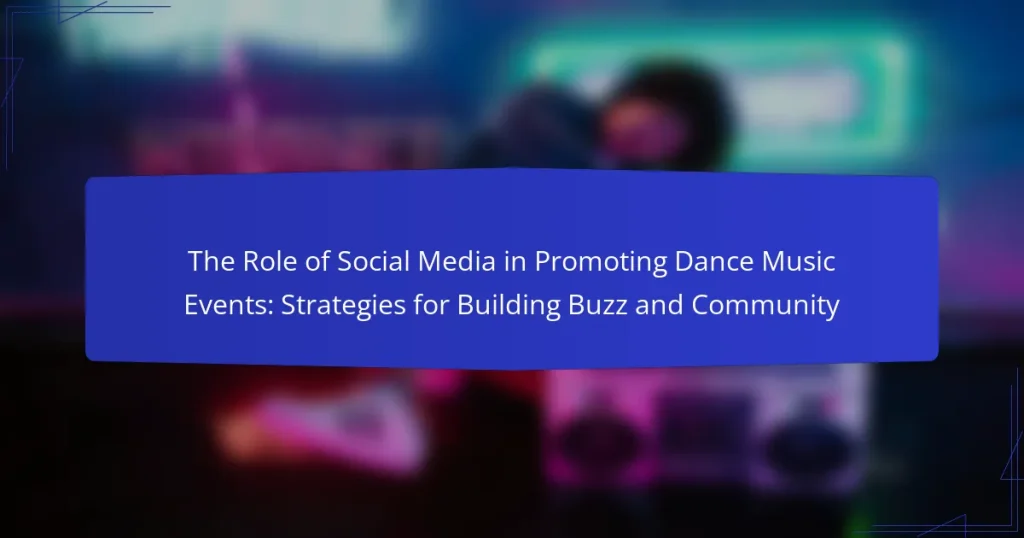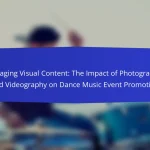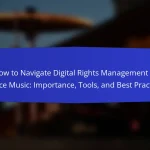Social media is a vital tool for promoting dance music events, allowing event organizers to connect with a broad audience efficiently. Key platforms such as Facebook, Instagram, and Twitter facilitate real-time engagement, enabling the sharing of event details, visuals, and updates while fostering community among fans and artists. Effective strategies include creating engaging content, utilizing high-quality visuals, and leveraging user-generated content to enhance visibility. Emerging trends like TikTok’s viral marketing potential and live streaming capabilities further amplify reach and engagement. The article explores these strategies and trends, emphasizing the importance of consistent messaging and targeted advertising in building excitement and community around dance music events.
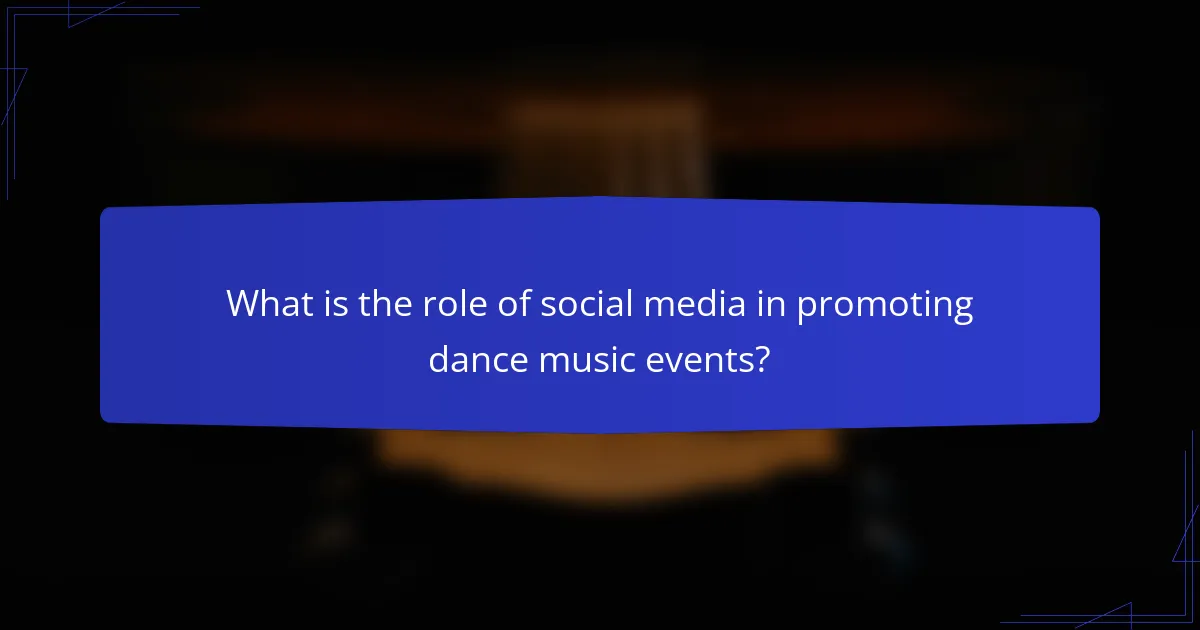
What is the role of social media in promoting dance music events?
Social media plays a crucial role in promoting dance music events. It enables event organizers to reach a wide audience quickly. Platforms like Facebook, Instagram, and Twitter facilitate direct engagement with potential attendees. Social media allows for sharing event details, visuals, and updates in real time. It also fosters community building among fans and artists. Moreover, user-generated content can amplify event visibility. Studies show that 78% of event attendees discover events through social media. This highlights its effectiveness as a promotional tool in the dance music scene.
How does social media influence audience engagement for dance music events?
Social media significantly enhances audience engagement for dance music events. It provides platforms for artists and organizers to share event information and updates. Social media allows fans to interact directly with their favorite artists. This interaction fosters a sense of community among fans. User-generated content, such as videos and photos from events, amplifies engagement. Data shows that events promoted through social media see higher attendance rates. For instance, a study by Eventbrite found that 90% of event organizers believe social media is crucial for promoting events. Social media also facilitates real-time feedback and engagement during events.
What platforms are most effective for promoting dance music events?
Social media platforms are most effective for promoting dance music events. Platforms like Facebook, Instagram, and TikTok offer extensive reach and engagement. Facebook allows for event creation and targeted advertising. Instagram’s visual content is ideal for showcasing artists and venues. TikTok’s viral nature helps reach younger audiences quickly. These platforms support community building through comments and shares. Statistics show that 79% of event organizers use social media for promotion. Additionally, 60% of attendees find events through social media channels.
How do different demographics interact with social media in the context of dance music?
Different demographics interact with social media in the context of dance music through varied platforms and engagement styles. Younger audiences, particularly those aged 18-24, predominantly use platforms like TikTok and Instagram. They engage through short videos, challenges, and live streams featuring dance music.
Older demographics, such as those aged 25-34, prefer Facebook and YouTube for longer content and event promotion. They often share event pages and engage in discussions about music trends.
Research shows that 72% of Gen Z uses social media to discover new music, while 60% of millennials rely on it for event information. This indicates a strong reliance on social media for music discovery across age groups.
Additionally, cultural background influences engagement. For instance, Latinx communities may favor platforms like WhatsApp for event organization and sharing music.
Overall, social media serves as a diverse tool for connecting different demographics to dance music, shaping their experiences and interactions.
What strategies can be employed to build buzz around dance music events on social media?
Engaging content strategies can effectively build buzz around dance music events on social media. Utilize eye-catching visuals and videos that showcase the event’s atmosphere. Create countdown posts to generate excitement as the event date approaches. Collaborate with influencers in the dance music scene to reach a wider audience. Encourage user-generated content by hosting contests and giveaways. Use targeted ads to reach specific demographics interested in dance music. Share behind-the-scenes content to create a personal connection with potential attendees. Leverage hashtags relevant to the event to increase visibility. Engage with followers through polls and questions to foster community interaction.
How can event organizers leverage influencers to enhance event visibility?
Event organizers can leverage influencers to enhance event visibility by collaborating with them for promotional content. Influencers can create engaging posts that highlight the event details. They can share their personal experiences and excitement about attending. This generates buzz and encourages their followers to participate. Influencer reach can significantly expand the event’s audience. Research shows that 49% of consumers depend on influencer recommendations. This trust translates into higher ticket sales and attendance. Additionally, influencers can provide exclusive content, such as behind-the-scenes access, which adds value. Overall, influencer partnerships can amplify marketing efforts and enhance community engagement.
What types of content are most effective in generating excitement for dance music events?
Visual content, such as videos and images, is most effective in generating excitement for dance music events. Engaging visuals capture attention quickly and convey the energy of the event. Behind-the-scenes footage creates a personal connection with the audience. Live streams of performances allow fans to experience the event in real time. User-generated content, like fan photos or videos, fosters community and engagement. Countdown posts build anticipation as the event date approaches. Interactive content, such as polls or contests, encourages participation and sharing. These types of content have been shown to increase engagement rates significantly, with video content generating 1200% more shares than text and images combined.
How does community building on social media impact dance music events?
Community building on social media significantly enhances dance music events. It fosters a sense of belonging among fans. This engagement leads to increased attendance at events. Social media platforms allow for real-time interaction and feedback. Artists and promoters can share updates and exclusive content. This creates anticipation and excitement for upcoming events. Additionally, community-driven content can amplify event visibility. According to a study by Eventbrite, 80% of event attendees are influenced by social media interactions. This statistic underscores the importance of building a community online.
What are the benefits of fostering a community around dance music events?
Fostering a community around dance music events enhances social connections and engagement among attendees. This community building creates a sense of belonging and shared experience. Participants often feel more connected to the music and artists when they share these moments with others. Moreover, a strong community can lead to increased attendance at events. Research indicates that events with a dedicated following often sell out more quickly. Additionally, communities can amplify promotional efforts through word-of-mouth and social media sharing. This organic promotion can significantly extend the reach of event marketing. Engaged communities also provide valuable feedback to organizers, helping to improve future events. Ultimately, fostering a community around dance music events contributes to a vibrant and sustainable music culture.
How can social media facilitate networking among fans and artists?
Social media facilitates networking among fans and artists by providing direct communication channels. Artists can share updates, music, and personal insights, fostering a connection with their audience. Fans can engage through comments, likes, and shares, creating a sense of community. Platforms like Instagram and Twitter allow for real-time interactions, enhancing relationships. Hashtags help fans discover artists and connect with others who share similar interests. Events can be promoted easily, encouraging fans to attend and meet artists. According to a 2020 study by the Pew Research Center, 72% of adults use social media, increasing the potential for networking. These interactions can lead to collaborations and increased visibility for both artists and fans.
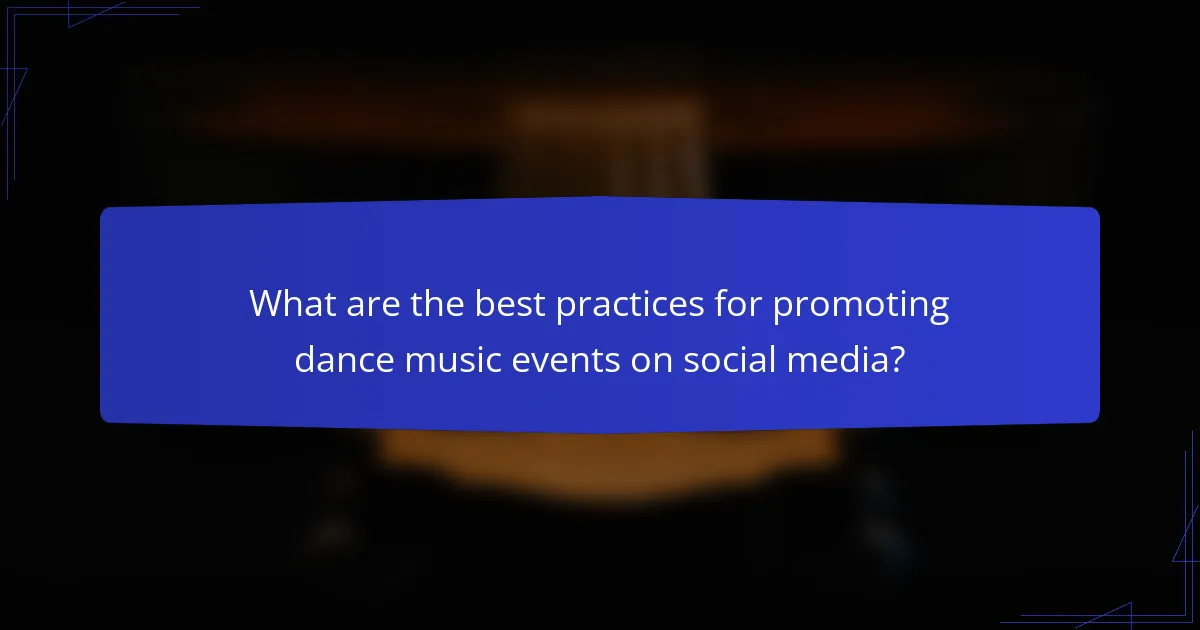
What are the best practices for promoting dance music events on social media?
Utilizing social media effectively promotes dance music events. First, create engaging content that showcases artists and the event atmosphere. Use high-quality visuals and videos to capture attention. Regularly post updates to maintain excitement and anticipation. Engage with followers through polls, contests, and Q&A sessions to foster community involvement. Collaborate with influencers to expand reach and credibility. Utilize targeted ads to reach specific demographics interested in dance music. Track engagement metrics to adjust strategies and improve future promotions. Consistency and authenticity in messaging build trust and a loyal audience.
How can event organizers create a cohesive social media strategy?
Event organizers can create a cohesive social media strategy by defining clear goals and target audiences. Establishing specific objectives helps guide content creation. Identifying the target audience allows for tailored messaging and engagement. Consistent branding across all platforms is essential for recognition. Using a content calendar can streamline posts and maintain regularity. Engaging with the audience through interactive content fosters community. Analyzing performance metrics helps refine strategies over time. Research shows that cohesive strategies increase audience engagement by up to 60%.
What role does branding play in the promotion of dance music events?
Branding is crucial in promoting dance music events. It establishes a unique identity for the event. A strong brand attracts attendees and creates recognition. Effective branding communicates the event’s theme and vibe. It helps differentiate the event from competitors. Consistent branding across platforms enhances visibility. Research shows that events with strong branding see higher ticket sales. For example, well-branded festivals often sell out faster than unbranded ones.
How can analytics be used to measure the success of social media campaigns?
Analytics can be used to measure the success of social media campaigns by tracking key performance indicators (KPIs). These KPIs include engagement rates, reach, impressions, and conversion rates. For instance, engagement rates indicate how well content resonates with the audience. A high engagement rate suggests effective communication and audience interest. Reach measures how many unique users see the posts, reflecting the campaign’s visibility. Impressions show how often the content is displayed, regardless of user interaction. Conversion rates track the number of users taking desired actions, such as ticket purchases or sign-ups. By analyzing these metrics, marketers can assess the effectiveness of their strategies in promoting dance music events. Data from platforms like Facebook and Instagram provide insights into audience demographics and behavior. This information helps refine future campaigns for better results.
What common pitfalls should be avoided in social media promotion for dance music events?
Common pitfalls in social media promotion for dance music events include inconsistent branding. Maintaining a cohesive brand image is crucial. Disregarding audience engagement can lead to reduced interest. Failing to respond to comments or messages may alienate followers. Over-posting can overwhelm audiences and cause disengagement. Under-posting can result in lost visibility and interest. Ignoring analytics prevents effective strategy adjustments. Not leveraging partnerships with influencers can limit reach. Lastly, neglecting to create shareable content diminishes organic promotion potential.
How can over-promoting negatively impact audience perception?
Over-promoting can lead to audience fatigue and negative perception. When audiences are bombarded with excessive promotional content, they may feel overwhelmed. This can result in decreased engagement and interest in the event. Research shows that 70% of consumers find repetitive advertising annoying. Annoyance can lead to a loss of trust in the brand or event. Additionally, over-promoting can create a sense of inauthenticity. Audiences may perceive the event as desperate for attention. This perception can diminish the perceived value of the event. Ultimately, over-promotion can alienate the audience rather than build a community.
What are the consequences of neglecting audience feedback on social media?
Neglecting audience feedback on social media can lead to significant consequences for brands and event promoters. First, it can result in a disconnect between the audience and the brand. This disconnect often leads to decreased engagement and loyalty. When audience concerns are ignored, dissatisfaction grows. As a result, negative sentiment can spread, damaging the brand’s reputation.
Additionally, failing to address feedback can hinder the ability to improve products or services. Without understanding audience preferences, brands may miss opportunities for innovation. This can lead to stagnant growth and reduced competitiveness in the market.
According to a study by Sprout Social, 70% of consumers feel more connected to brands that respond to them on social media. This highlights the importance of engagement. Ignoring feedback can thus lead to missed connections and lost opportunities for community building.
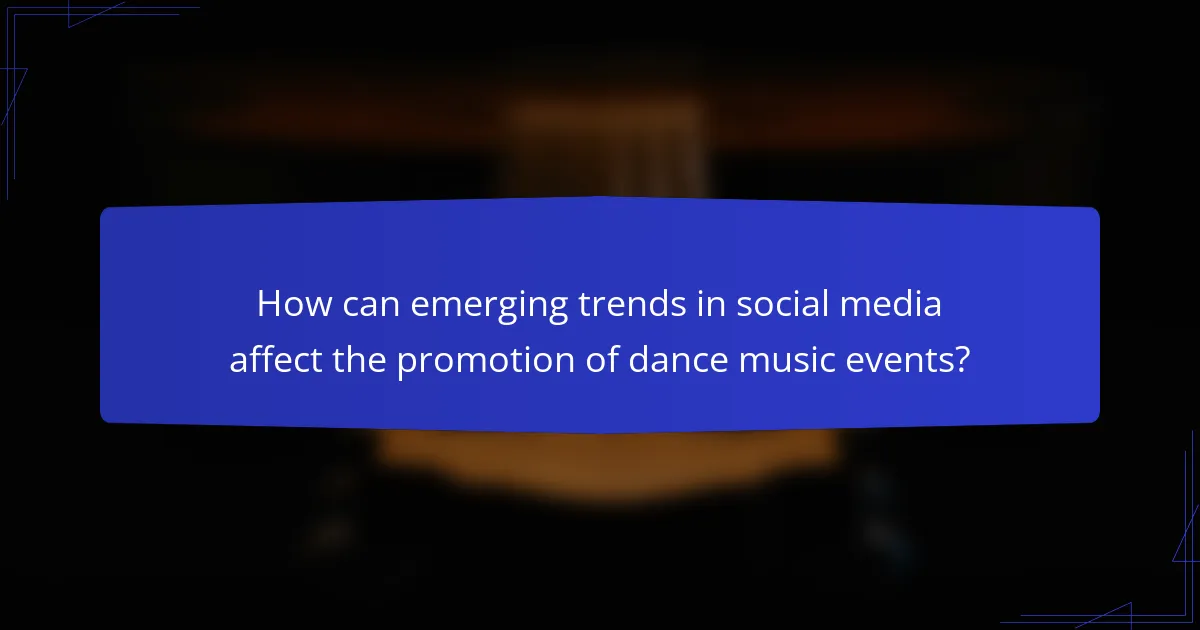
How can emerging trends in social media affect the promotion of dance music events?
Emerging trends in social media significantly enhance the promotion of dance music events. Platforms like TikTok and Instagram enable viral marketing through user-generated content. Short video formats allow fans to share snippets of performances, increasing event visibility. Hashtags and challenges can create community engagement around specific events. Live streaming capabilities allow artists to reach wider audiences in real-time. Data from Statista shows that 54% of social media users influence event attendance through their online interactions. Additionally, targeted advertising on social media can reach specific demographics effectively. These trends create a dynamic environment for promoting dance music events.
What new features on social media platforms can be utilized for event promotion?
Social media platforms have introduced several new features that can enhance event promotion. Live streaming allows real-time engagement with audiences during events. Stories provide a temporary way to share updates and behind-the-scenes content. Polls and Q&A features enable direct interaction and feedback from potential attendees. Event countdowns create anticipation and remind followers of upcoming dates. Hashtags improve visibility and help track conversations around the event. Collaborative posts with influencers can expand reach and attract new audiences. These features collectively increase engagement and help build a community around the event.
How do live streaming and virtual events change the landscape for dance music promotion?
Live streaming and virtual events significantly transform dance music promotion by expanding reach and accessibility. They allow artists to connect with global audiences without geographical limitations. Traditional venues often restrict attendance, but virtual platforms can host thousands simultaneously. This change enhances fan engagement through interactive features like live chats and Q&A sessions. According to a 2021 survey by Beatport, 70% of fans expressed increased interest in virtual events. Additionally, live streaming reduces promotional costs associated with physical venues. Artists can leverage social media to promote these events, creating buzz and building community. Overall, live streaming and virtual events democratize access to dance music experiences.
What role does user-generated content play in shaping event marketing strategies?
User-generated content significantly influences event marketing strategies. It enhances authenticity and fosters community engagement. Event organizers leverage user-generated content to build trust with potential attendees. For example, 79% of consumers say user-generated content highly impacts their purchasing decisions. This form of content includes reviews, photos, and videos shared by attendees. Such contributions create a sense of belonging and encourage participation. Additionally, user-generated content can amplify marketing reach through social sharing. Events that incorporate this content often experience higher engagement rates and increased ticket sales.
What practical tips can enhance social media promotion for dance music events?
Utilizing engaging visuals can enhance social media promotion for dance music events. High-quality images and videos attract more attention and shares. Posting behind-the-scenes content fosters a connection with the audience. Regular updates about the event build anticipation and excitement. Collaborating with influencers can expand reach to new audiences. Creating event-specific hashtags encourages user-generated content. Running contests or giveaways incentivizes sharing and engagement. Engaging with followers through comments and messages fosters community and loyalty.
How can event organizers effectively engage with their audience on social media?
Event organizers can effectively engage with their audience on social media by creating interactive content. This includes polls, Q&A sessions, and live videos. Engaging posts encourage audience participation and feedback. Organizers should also share behind-the-scenes content to build a personal connection. Regular updates about event details keep the audience informed and excited. Utilizing hashtags can enhance visibility and foster community discussions. Responding promptly to comments and messages shows that organizers value their audience. According to a study by Sprout Social, 70% of consumers feel more connected to brands with which they can engage on social media.
What tools can assist in managing social media campaigns for dance music events?
Social media management tools can effectively assist in managing campaigns for dance music events. Platforms like Hootsuite and Buffer enable scheduling and monitoring of posts across multiple networks. These tools provide analytics to track engagement and reach. Additionally, Canva offers design templates for creating eye-catching visuals. Eventbrite can help manage ticket sales and promote events on social media. Sprout Social provides in-depth reporting and audience insights. These tools streamline the process and enhance campaign effectiveness.
The main entity of this article is social media and its role in promoting dance music events. The article explores how social media platforms facilitate audience engagement, community building, and effective promotional strategies. It highlights the importance of various platforms like Facebook, Instagram, and TikTok in reaching diverse demographics and generating excitement through user-generated content. Additionally, the article discusses best practices for leveraging influencers, creating engaging content, and utilizing analytics to measure success, ultimately emphasizing the significant impact of social media on the dance music event landscape.
